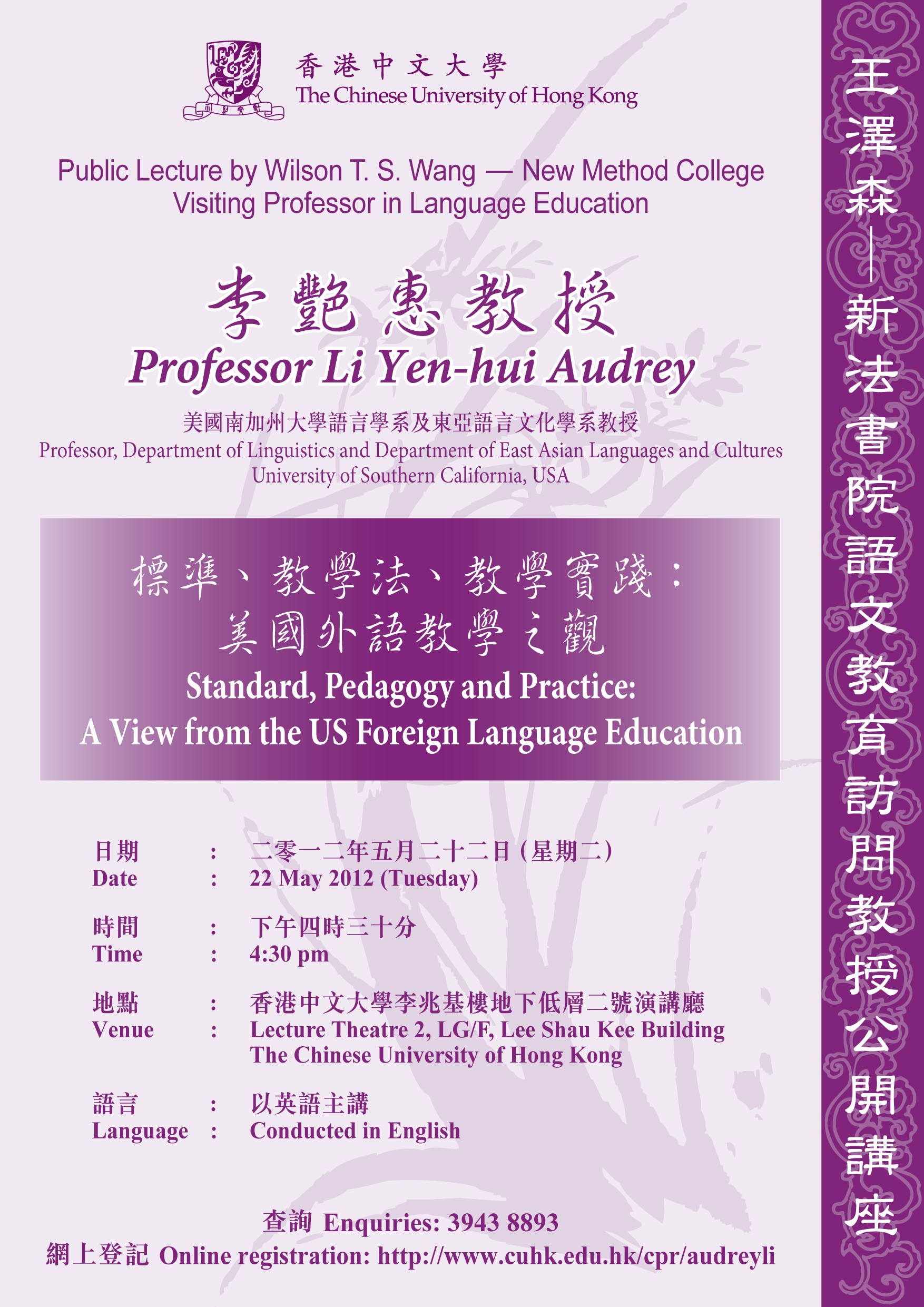Events
Wilson T.S. Wang – New Method College Visiting Professor in Language Education Public Lecture byProfessor Li Yen-hui Audrey on Standard, Pedagogy and Practice:A View from the US Foreign Language Education (in English)
22 May 2012
4:30 pm
Lecture Theatre 2, LG/F, Lee Shau Kee BuildingThe Chinese University of Hong Kong
Professor Li Yen-hui Audrey is Professor of Linguistics and East Asian Languages and Cultures at the University of Southern California (USC). She served as the President of the Chinese Language Teachers Association of the US and is a life member of the Chinese Language Teachers Association and the International Association of Chinese Linguistics (IACL). She is currently serving as the President of the IACL. For over 20 years, through the support of USC and grants and awards from various other institutions and grant agencies, she has been devoted to language program development and theoretical linguistic research. For the work on language education, her focus has been to bring the results of research in theoretical linguistics and second language acquisition theories to language program development, curricular design and language instruction. Her theoretical linguistic research has largely been within the framework of generative grammar, investigating many topics such as constituency and order, structure of clauses and nominal expressions, referential dependencies, wh-constructions, quantification, scope, ellipsis and argument structure. The areas include syntax, the syntactic interface with phonology and semantics. The approach is generally comparative, bringing the insight from cross-linguistic investigations to the characterization of Universal Grammar and understanding of specific languages, especially Chinese. Her major publications include books from the Cambridge University Press (The Syntax of Chinese), MIT Press (Essays on the Representational and Derivational Nature of Grammar: The Diversity of Wh-constructions, Syntax of Scope), RoutledgeCurzon Press, Kluwer(Springer), etc., and articles in various journals internationally. She is currently co-editing a book for the Oxford University Press and another one for the Blackwell Publishers.
Proficiency standards are essential to help foreign language students understand how they are learning, whether they perform at least as well as their peers, and to help instructors design their curricula and evaluate the effectiveness of their programs. In addition, the increased attention in recent years to defining learners’ outcomes and the stricter requirement of measurable effectiveness from accreditation and grant agencies have made language proficiency standards even more relevant to the field of foreign language instruction. The pedagogical implication is the advocacy of “best practices”. “Best practices” in language education emphasize learner-centered instruction, backward design, target language only, among others. Course materials are more theme-based and task performances favored over the learning of discrete grammatical items. However, efforts to promote standards for language proficiency and the “best practices” in language instruction have generally faced great challenges because the curricula of an overwhelming majority of language programs are textbook-based. Teachers generally are more concerned about how they can finish the planned number of lessons. The “best practices” do not seem to be easily incorporated into textbook-based curricula. Moreover, there have been frequent doubts regarding the appropriateness of such practices, in fear of sacrificing accuracy in favor of fluency. The core of the accuracy-fluency debate resides in the difference in the pedagogical considerations on what facilitates the training of proficient students as effectively and efficiently as possible.
This presentation discusses the latest Chinese college (K16) proficiency standards and addresses the noted difficulty and debate from the perspective of theoretical and experimental studies on cognition and memory, second language acquisition and theories of languages. As the years of study on second language acquisition and theoretical linguistics have shown, language learning is a continuing process of revising one’s internal linguistic system towards the final state parallel to that of a native speaker – progressing through the various stages of interlanguage on the basis of primary linguistic data. Effective second or foreign language instruction facilitates the acquisition of a new system on top of an established one (first language) and the progression through the intermediate stages. Successful strategies are built on clear understandings of a learner’s innate language learning capabilities, the effect of L1 acquisition on such capabilities and the challenges in integrating a new linguistic system with a deeply rooted one. The notions of universal grammar (shared properties in human languages) and parameters (clusters of systematic differences between languages) underlying generative grammatical research, coupled with the selection and arrangement of primary linguistic data relevant to the setting of parameters, can benefit second/foreign language teaching and learning. In addition, the result of cognition and memory studies supports the role of task performance in effectively acquiring language.
Based on these theoretical groundings and some innovative technological applications, I will suggest some concrete measures for curricular designs, course material presentations, and learning activities that may better integrate the “best practices” to textbook-based programs so that language instruction can truly move to facilitating students’ obtaining higher proficiency in a more relevant and interesting manner.




